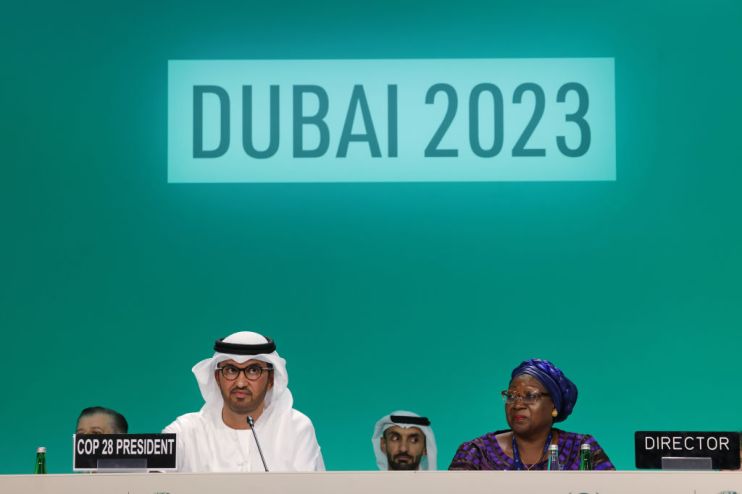COP28: What does the City think?

Ineffective displacement of private and public capital is continuing to hamper global efforts to slow climate change, City ESG experts have warned.
City A.M. spoke to Square Mile decision-makers to check the temperature on what COP28 means to the City of London and the UK economy as a whole.
A “global process”
Cynics of the efficacy of COP28 as a productive exercise are commonplace.
Much of this scepticism likely stems from the murky and, at times, all-encompassing world of ESG and its role in the modern global economy.
Rather than producing definitive, measurable frameworks for environmental progress, COP meetings to date have brought about targets for 2030, 2040, 2050 and beyond, but without a coherent strategy.
“There are of course going to be huge challenges every time you try and get 200 countries in a room to get them to agree to something,” said James Alexander, chairman of the Global Sustainable Investment Alliance, a membership group for financial institutions across the world.
He told City A.M.: “But we see COP as a really important part of the global process of advancing towards a more sustainable future.”
So where does COP28 pick up from one year ago?
Perhaps the defining legacy of last year’s instalment in Sharm el-Sheikh, Egypt, was the lack of a major logistical breakthrough.
Marred by the then-recent Russian invasion of Ukraine, the conference failed on more fronts than it succeeded, agreeing nothing to phase down coal production, producing no new targets or commitments and the $100bn a year commitment as promised in 2009 remained in the wind.
For those literally and figuratively invested in a greener future like Alexander, conferences like COP should be used for governments to lay the groundwork for economies to adjust.
“We need to create positive regulatory frameworks, get the corporate data and the corporate disclosures in place as well as create investment propositions,” he said.
“Governments need to be working with us to say ‘this is the future we are aiming towards, this is where we want to see investment flows and this is how government’s going to support that, both internationally and domestically’.”
COP28: Applying public pressure to leaders
Lobbying ‘for good’ is also a key element of COP proceedings.
Ahead of this year’s summit, over 130 multinational companies such as Ikea, Heineken and eBay signed an open letter as they attempted to apply public pressure on the attending world leaders to act on fossil fuel reduction.
Many in the investment space have also said they want to see a show of force.
“The private investor community specifically needs to show that capital will be available to climate solutions and the entrepreneurs and inventors behind them so they can know that innovations can scale rapidly and that buyers will be available.” said Peter Hirsch, head of sustainability at climate-forward venture capital firm 2150.
Laura Houet, global co-head of ESG at law firm CMS, agrees. Speaking to City A.M. yesterday, she said regulators and businesses are focusing on different things for the same goal, which is actually hindering progress.
“I think the City cares about the aims of COP, more than COP itself,” she said.
“While the regulators are focusing on disclosure, disclosure, disclosure, businesses are keen to get on with the job of taking action to meet their climate and other sustainability targets.
“Support from COP to lead that change, to push the Nationally Determined Contributions (NDCs) and to mobilise private finance to support developing countries are all fundamental to progress, but we need the action after the talking.”
It is a stalemate of indecision. Governments around the world have been reluctant to commit to pledges with large price tags, while businesses will not commit future capital to initiatives that may not have government support.
Dr Matthew Bell, EY’s global climate change and sustainability services leader, sees COP28 as the perfect setting to resolve these issues.
“Had you asked me five years ago, I would have said ‘do not tell us about COP, it is a policy process, it is actually not for business, you cannot even get in there,” he told City A.M.
“That has changed quite dramatically and I think it is beneficial to the businesses who have been in the last few years, but also to the UN and country level policymakers because they need to understand how this gap is going to be bridged and it is going to be the private sector that does it.”
One end of the bargain the private sector has not been keeping up is the quality of climate reporting.
This week, EY launched a report showing nearly half (47 per cent) of 1500 global companies surveyed do not disclose a transition plan to back their climate reporting.
This figure has improved since last year, but only by six per cent and is likely to remain low while high-polluting major markets such as China, India and Indonesia carry no mandatory climate disclosure requirements.
Looking for a path forward
It stands to reason that COP28 should prove the arena in which these countries are held to account for their inaction to date and a path forward agreed.
In his first address to the conference yesterday, its president and head of the UAE’s national oil company Dr. Sultan Ahmed Al Jaber, said “the science has spoken, it has confirmed that the moment is now to find a new road.”
As Mark Lumsdon-Taylor, partner and head of ESG at chartered accounts MHA put it to City A.M. on the eve of the conference, for those on the outside looking in, COP28 is the best we have got.
“There is no alternative,” he said.